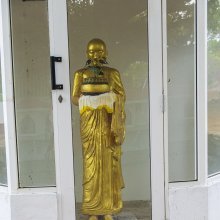Theri, Therī: 5 definitions
Introduction:
Theri means something in Buddhism, Pali, Jainism, Prakrit, biology. If you want to know the exact meaning, history, etymology or English translation of this term then check out the descriptions on this page. Add your comment or reference to a book if you want to contribute to this summary article.
Images (photo gallery)
Biology (plants and animals)
Source: Wisdom Library: Local Names of Plants and DrugsTheri [തേരി] in the Malayalam language is the name of a plant identified with Flemingia strobilifera (L.) W.T.Aiton from the Fabaceae (Pea) family having the following synonyms: Flemingia bracteata, Flemingia fruticulosa, Zornia strobilifera. For the possible medicinal usage of theri, you can check this page for potential sources and references, although be aware that any some or none of the side-effects may not be mentioned here, wether they be harmful or beneficial to health.
Source: Google Books: CRC World Dictionary (Regional names)Theri in India is the name of a plant defined with Flemingia strobilifera in various botanical sources. This page contains potential references in Ayurveda, modern medicine, and other folk traditions or local practices It has the synonym Hedysarum strobiliferum L. (among others).
Example references for further research on medicinal uses or toxicity (see latin names for full list):
· Icones Plantarum Indiae Orientalis (1840)
· Flora Indica (1832)
· Hortus Kewensis (1812)
· Species Plantarum (1753)
· American Journal of Botany (1944)
· Hort. Bengal (1814)
If you are looking for specific details regarding Theri, for example health benefits, pregnancy safety, side effects, chemical composition, extract dosage, diet and recipes, have a look at these references.

This sections includes definitions from the five kingdoms of living things: Animals, Plants, Fungi, Protists and Monera. It will include both the official binomial nomenclature (scientific names usually in Latin) as well as regional spellings and variants.
Languages of India and abroad
Pali-English dictionary
Source: BuddhaSasana: Concise Pali-English Dictionarytherī : (f.) a senior nun; and old woman.
Source: Sutta: The Pali Text Society's Pali-English DictionaryTherī, & Therikā (f.) (see thera) 1. an old woman (cp. sthavirikā M Vastu III, 283) Pv. II, 116 (=thāvarijiṇṇā PvA. 149).—2. a female thera (see cpds.), as therikā at Th. 2, 1; Dpvs xviii. 11.

Pali is the language of the Tipiṭaka, which is the sacred canon of Theravāda Buddhism and contains much of the Buddha’s speech. Closeley related to Sanskrit, both languages are used interchangeably between religions.
Prakrit-English dictionary
Source: DDSA: Paia-sadda-mahannavo; a comprehensive Prakrit Hindi dictionaryTherī (थेरी) in the Prakrit language is related to the Sanskrit word: Sthavirā.
Therī has the following synonyms: Theriyā.
Prakrit is an ancient language closely associated with both Pali and Sanskrit. Jain literature is often composed in this language or sub-dialects, such as the Agamas and their commentaries which are written in Ardhamagadhi and Maharashtri Prakrit. The earliest extant texts can be dated to as early as the 4th century BCE although core portions might be older.
See also (Relevant definitions)
Starts with (+40): Teri, Teri-kaviceyyul, Teri-nilaiummai, Teri-nilaivinai, Teri-vilpukalcci, Tericam, Tericanai, Tericanaveti, Terici, Tericiyam, Tericoru, Terij, Terikatai, Terikkal, Terikkappecu, Terikkati, Terima, Terimananappul, Terimurru, Terinakattai.
Ends with (+34): Abhayattheri, Abhirupa Nanda Theri, Addhakasi Theri, Bhadda Kapilani Theri, Bhadra Theri, Bodhi Theri, Capa Theri, Catteri, Cimputeri, Cirakuteri, Citteri, Ekapindadayika Theri, Ekasanadayika Theri, Ekuposathika Theri, Etutteri, Gotheri, Isidasi Theri, Itaiteri, Kakateri, Kantheri.
Full-text (+124): Therigatha, Somanadeva, Bahuputtika, Japamala, Naramitta, Mahadevi, Sanha, Mahakali, Shata, Sthavira, Oghataka, Mekhaladayika, Bhataragama, Sattuppalamalika Theri, Samuddanava, Theriya, Vajira Sutta, Cala Sutta, Dhammatapasa, Mahila.
Relevant text
Search found 24 books and stories containing Theri, Therī, Thērī; (plurals include: Theris, Therīs, Thērīs). You can also click to the full overview containing English textual excerpts. Below are direct links for the most relevant articles:
Guide to Tipitaka (by U Ko Lay)
Part 13 - Apadana Pali < [Chapter VIII - Khuddaka Nikaya]
Part 9 - The Theri Gatha Pali < [Chapter VIII - Khuddaka Nikaya]
The Great Chronicle of Buddhas (by Ven. Mingun Sayadaw)
Biography (11) Yasodharā Therī < [Chapter 44 - Life Histories of Bhikkhunī Arahats]
Part 7 - The Noble Practice of Fraternal Living (Sāranīya) < [Chapter 40 - The Buddha Declared the Seven Factors of Non-Decline for Rulers]
Part 2 - The Vijaya Sutta and its Translation < [Chapter 34a - The Buddha’s Seventeenth Vassa at Veḷuvana]
Apadana commentary (Atthakatha) (by U Lu Pe Win)
Commentary on internal preface (abbhantara-nidāna) < [Chapter 1 - Buddhavagga (Buddha section)]
Dipankara Buddha predicts Buddhahood for Sumedha < [Part 1 - Remote preface (dūre-nidāna)]
Dipavamsa (study) (by Sibani Barman)
Chapter 3 - Contribution of Mahinda & Saṅghamittā
Mahavamsa (by Wilhelm Geiger)
Chapter 19 - The Coming Of The Bodhi-tree
Chapter 20 - The Nibbana Of The Thera
A Correct Vision (by Venerable Professor Dhammavihari)
